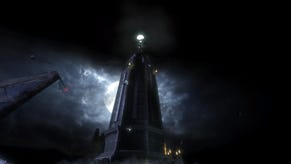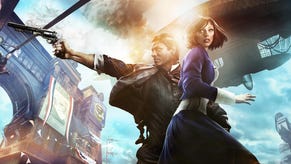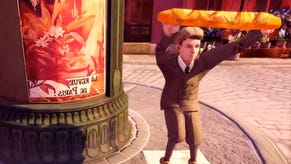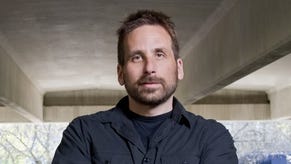BioShock Infinite
The shock of the old.
Levine then introduces a live gameplay demo that, frankly, is almost too good. A condensed barrage of spectacle and set-piece rattles past us, picking out elements of the gameplay just long enough to register but not so long that we can dwell on them. It's a slice of tightly-scripted performance gaming that stretches credibility in places - without ever quite breaking it, to be fair - and raises questions about just how linear and contained the final game is going to be.
You can't fake the magnificent artwork, however, the reach of the new game engine, or the wealth of contextual detail and thought that's been applied to this wild, quasi-steampunk alternate history. BioShock Infinite is a stunning game, every bit as sumptuous as the original but blasting open its snow-globe world and flooding it with light, colour and space. Maybe it's just the palette change, but it seems to have a more hand-drawn, pronounced and painterly look - cartoon would be the wrong word - that brings the Fable games to mind. It's lush.
It was Irrational's mastery of tone and the way it fed details of the city's secret history through the environments and the artwork that set BioShock apart, and from the demo it's clear that Infinite is no different. It begins with a triumphalist poster swimming blurrily into view, depicting a stout George Washington holding the Liberty Bell aloft surrounded by craven, jingoistic caricatures of racial stereotypes. "It Is Our Holy Duty To Guard Against The Foreign Hordes," reads the legend.
It's not that subtle, but Columbia is not a subtle place, and you sense that Levine is aiming for a more robust, satirical tone and more pointed engagement with politics this time around. As De Witt sets off down a cobbled street, a broken mechanical horse and cart limps and screeches past, plastered in newspaper headlines shouting, "Anarchists Loose". At the end of the street, a flying church's tenuous grip on the air fails it, and it lurches and falls, its tower toppling and bell crashing into the street in front of us.
"They'll Take Your Gun - They'll Take Your Wife - They'll Take Your Business - They'll Take your Life," read the hustings slogans at a bunting-draped bandstand where a local worthy hectors nobody in particular. We take the hint, picking up a sniper rifle with a burnished bronze scope, and the speaker takes exception. His eyes glow and he assaults us with telekinetic powers, and summons a crowd of bloody-beaked crows to pester us - this power, Murder of Crows, we pick up later by drinking from a handsomely-moulded flask.
Combat is sporadic, and not necessarily triggered immediately. You can't be sure which side the inhabitants of Columbia are on, and whether they'll be hostile. At one point, we enter a saloon - its dark wood, gleaming brass and shaded lamps a strangely comforting echo of Rapture - and there's a tense moment when its patrons look at DeWitt with mixed curiosity and disinterest before one attacks with a shotgun from behind.








